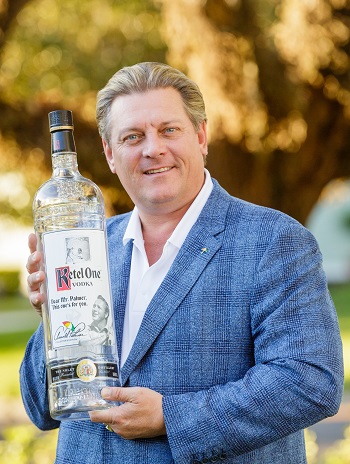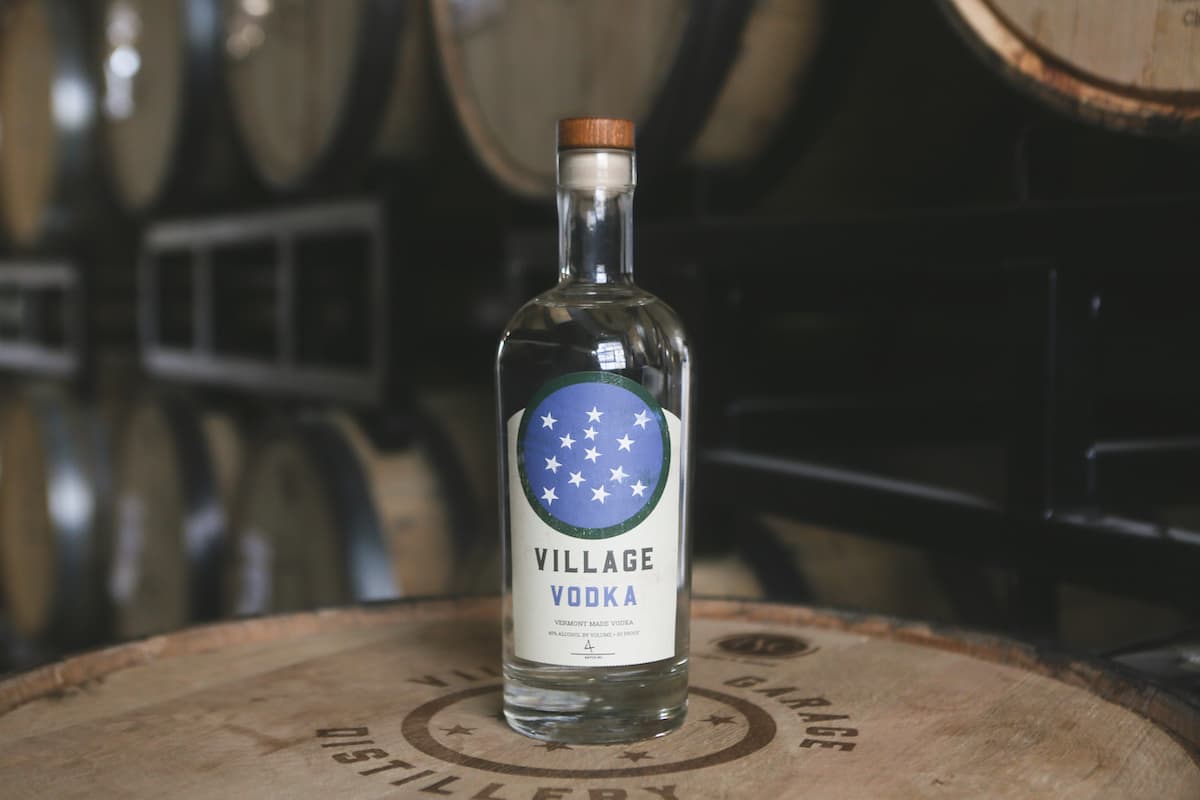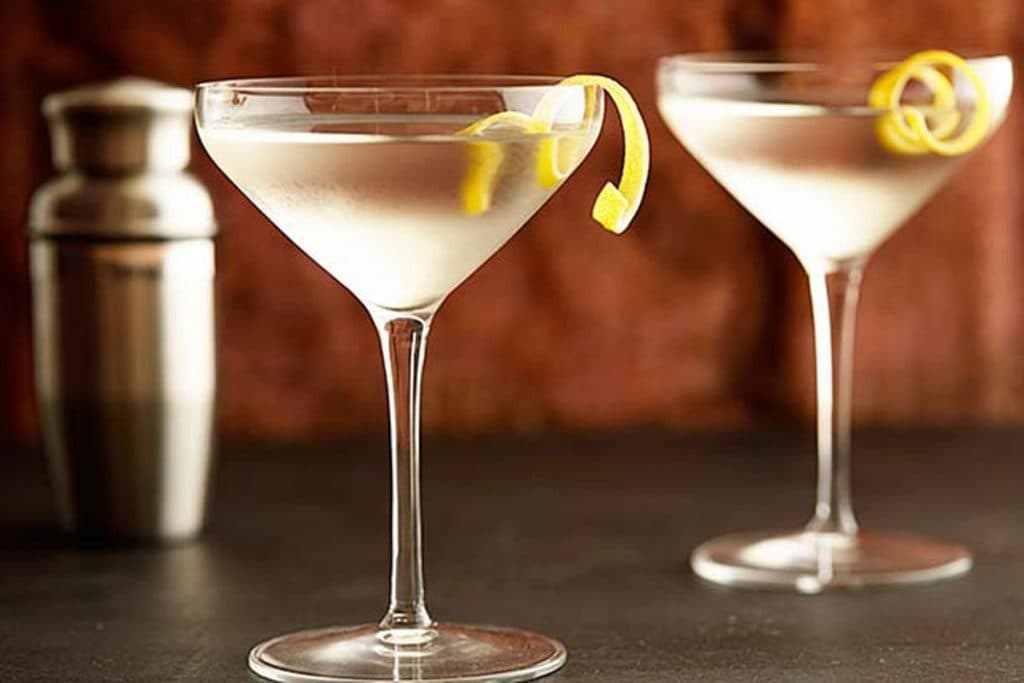
Carl Nolet Jr
Ketel One is an anagram?
That’s just one of the things we learned while sitting down with Carl Nolet Jr. over Bloody Marys at last month’s Arnold Palmer Invitational. Nolet Spirits, which produces Ketel One Vodka, traces its origins back to 1691: Carl represents the 11th generation of Nolets to work in the family business.
Arnold Palmer, who passed away in September 2016, was a close personal friend of the Nolets. In honor of the late golfer, Ketel One has released its Arnold Palmer Collector’s Edition bottle, which features the likeness and iconic signature of Arnold Palmer.
CE: When you evaluate a good vodka, are you looking for a spirit where the flavor is really distinctive, or do you prefer a very clean, neutral, smooth experience?
CN: When my dad started making Ketel One in the ’80s after he’d tasted so many vodkas that were around at that time, he particularly thought he could improve on the quality by using his pot stills. And that’s why Ketel One is named Ketel One. It’s named after the distilling kettle number one.
The kettle is a very important part of the distillation process because it removes the impurities of the alcohol to create something of exceptional taste and smoothness. That’s what he was after. Still, today, 250 new vodkas come into the United States of America, and they’re benchmarking themselves against Ketel One.
Also, the name “Ketel One” includes our family name. If you take the “k” and the “e” out of “Ketel”, and remove the “e” from “One”, you’ve got our family name “Nolet” in there, which not many people know. So it’s a multi-use word, but also named after the distilling kettle.
CE: 250 each year? That’s a lot of vodkas.
CN: Yes, each year. And just imagine that we’ve only been here 27 years. Do the math times 250. A lot of brands have tried.
CE: Ninety percent of Ketel One sales are in North America. While the vodka is made in Holland, America is the biggest market, and it’s found great success here. Is there something about Ketel One that’s made it so successful in North America?
CN: Our focus was America. It’s more difficult to go around the world, and that’s why our partnership together with Diageo [the British alcohol multinational] has helped tremendously. We’re still in the seeding phase around the world. What my brother has done exceptionally well is start the Ketel One Bartender Foundation. There’s also something beautiful called World Class, which is an initiative by Diageo that puts all the top bartenders competing against each other for the coveted title of “world’s best bartender.” So now, countries like Indonesia, and so many other countries in Asia and even in Australia–who didn’t have the same level of bartending that we have today here in the United States–are now growing around the world. Simply because of all of our seeding as a brand and helping the bartender become who he is or she is today.
CE: Is there a certain market outside the U.S. that you’re most highly concentrated on?
CN: There are some fantastic gems. The United Kingdom is a great country to do business in. Israel is a fantastic country to do business in, with lots of Ketel One being enjoyed there. Although Canada is of course its own country, it’s part of our North American territory, but Canada is a fantastic country to do business in. Japan we’re starting to do business in. A wonderful country, great mixologists. Perfectionists of any trade, anything that they touch. It’s part of their culture.
CE: As a global company, and as you expand, are there challenges you face in terms of the way vodka is consumed in different countries?
CN: No, I think that overall the consumption is very similar. What we need to get to is finding the right talent, and I think that is always the most important thing. Brands make people; people don’t make brands. In our case, it is seamless. And we’ve believed for 325 years that we need people to explain what’s inside that bottle. And that’s what we pride ourselves on: the taste that’s inside the bottle, how it’s made. That has to be shared. And that’s why we do tastings and seminars in every account around the world before we sell Ketel One. If they like it, they take it. If they don’t, best for us not to try to sell it to them because there’s no interest. And if there’s no interest, you’ll never sell an extra bottle there.
CE: In how many countries is Ketel One currently sold?
CN: I believe it’s right around the hundred mark. It could be a little less, or it could be a little bit more. But it’s significant.
CE: In the last several years, a lot more emphasis has swung back towards whiskey and gin. Has that affected the vodka market, or the way that Ketel One operates?
CN: It has not affected us, because just as you do with horses, we keep blinders on and stay focused on what we need to do well. With that said, we have a wonderful gin called Nolet’s Silver. Which is an incredible collaboration between two brothers and their father. We see what the gin category goes through, and what we have decided to do, to change it all up, is to go with a wonderful nose of Turkish rose, which is very distinct. And a flavor profile that’s between fruits and flowers. It’s peaches, raspberries, and that combination is something very, very special. And anybody who doesn’t even like gin, loves this gin.
CE: I had it for the first time yesterday, and that was my impression. It was very nice, but it’s certainly a different product for people who don’t want that juniper bomb.
CN: You don’t always want to have a Christmas tree against your nose. That’s what it’s all about it.
CE: Any plans to expand into yet another spirit category?
CN: As a family business for this long, it’s all about innovation. And innovation is about creating new products that could be an extension of something you’ve done. In the case of Ketel One, we have a Ketel One Citroen and Ketel One Oranje, all-natural flavors. Going out, finding the growers, getting the best of the best that is available on this planet. Same thing that we’ve done sourcing the best ingredients for Nolet’s. As far as something else, we are a white spirits distiller, meaning that it’s unlikely at this moment that we would be making a whiskey or a scotch. Those are category specific, and country specific. Regional. But the Nolet family, we’re always looking for good opportunities in the future.
CE: One last question: What is your preferred vodka cocktail?
CN: My preferred cocktail is actually the Vesper. And the Vesper creates the best of both worlds for me. So it’s Ketel One and Nolet’s Gin with a little bit of Lillet Blanc. Perfect!
CE: I was also going to ask if you’re a Bloody Mary person, but I think that’s already been answered.
CN: I definitely enjoy a Bloody Mary in the morning, on the weekends.
CE: Ditto. Is there anything else you’d like to add?
CN: With this partnership, we’re trying to continue Arnold Palmer’s legacy [Ketel One recently donated $100,000 to the Arnie’s Army Charitable Foundation], and the spirit of giving, integrity, authenticity and just being a genuine human being on this planet. Those are the things that we share and have in common. Just like Arnie, don’t stand atop buildings yelling and screaming how wonderful we are–we do it by our actions.


